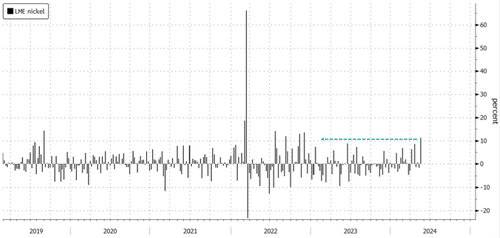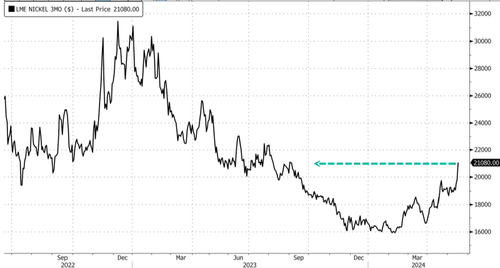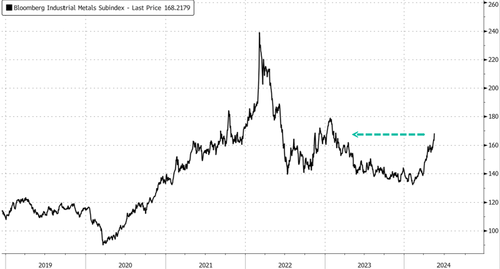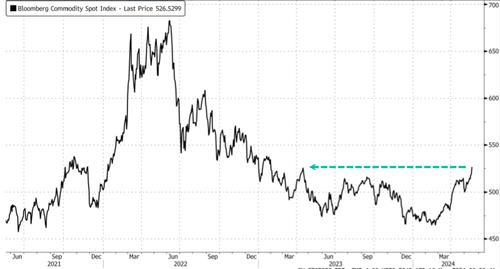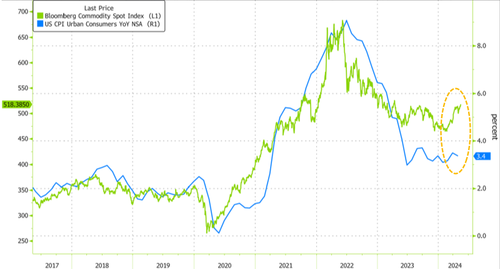Nickel prices on the London Metal Exchange just had their best week in nearly a year and a half. The surge comes as social unrest rocks New Caledonia. A new report highlighted last week about surging demand for base metals driven by the clean energy push, as well as central bankers hinting at interest rate cuts. This has fueled an upswing in nickel prices and commodity prices.
Let's begin with the unrest and riots that have gripped the French Pacific territory of New Caledonia. Additional French troops, including elite security forces, are en route to help authorities restore order. We outlined the latest on the riots in a note titled "France Blames Deadly New Caledonia Uprising On TikTok" on Friday morning.
This note will be commodity-centric and focus mainly on the nickel market. Last year, New Caledonia was the world's third-biggest producer of the battery metal. The tiny Pacific island accounted for 6% of global output, according to the US Geological Survey.
So far, French miner Eramet SA's output in the country has been disrupted, and it is currently operating at minimum capacity. This news helped propel nickel futures trading on the London Metal Exchange to its best trading week since early December 2022, rising a little more than 11%.
Nickel futures are trading at $20,880 a ton, or about the highest level since September 2023.
"We have seen these riots . . . If New Caledonia has an ongoing problem, then it is going to make a difference," Dan Smith, an analyst at Amalgamated Metal Trading, a brokerage, told the Financial Times. He noted that traders had been"downbeat" on the nickel market in terms of being oversupplied and that this sudden price spike had caught traders off guard.
However, Smith said the "overwhelming consensus" among traders was that the nickel market was "badly oversupplied," suggesting that the current rally would not last. "Demand is good for nickel [at the moment] but supply is even stronger," he added.
Ending the week was a report by the International Energy Agency that forecasted strong demand for nickel and other base metals critical for the transition to cleaner power grids as the powering up America and Europe theme takes off (read: "the Next AI Trade").
"The world's appetite for technologies such as solar panels, electric cars and batteries is growing fast . . . but we cannot satisfy it without reliable and expanding supplies of critical minerals," said IEA executive director Fatih Birol.
Rising nickel prices come as a massive dislocation of physical copper has sparked a squeeze in prices in New York.
The Bloomberg Industrial Metal Subindex has soared.
Spot commodity prices tracked by Bloomberg are also surging.
Jeff Currie might be right about an emerging commodity supercycle. And, of course, high commodity prices are bad news for Fed Powell's inflation fight.
All of this chaos is happening as the world splinters into a multi-polar state, an indication commodity prices will remain elevated.
Nickel prices on the London Metal Exchange just had their best week in nearly a year and a half. The surge comes as social unrest rocks New Caledonia. A new report highlighted last week about surging demand for base metals driven by the clean energy push, as well as central bankers hinting at interest rate cuts. This has fueled an upswing in nickel prices and commodity prices.
Let's begin with the unrest and riots that have gripped the French Pacific territory of New Caledonia. Additional French troops, including elite security forces, are en route to help authorities restore order. We outlined the latest on the riots in a note titled "France Blames Deadly New Caledonia Uprising On TikTok" on Friday morning.
This note will be commodity-centric and focus mainly on the nickel market. Last year, New Caledonia was the world's third-biggest producer of the battery metal. The tiny Pacific island accounted for 6% of global output, according to the US Geological Survey.
So far, French miner Eramet SA's output in the country has been disrupted, and it is currently operating at minimum capacity. This news helped propel nickel futures trading on the London Metal Exchange to its best trading week since early December 2022, rising a little more than 11%.
Nickel futures are trading at $20,880 a ton, or about the highest level since September 2023.
"We have seen these riots . . . If New Caledonia has an ongoing problem, then it is going to make a difference," Dan Smith, an analyst at Amalgamated Metal Trading, a brokerage, told the Financial Times. He noted that traders had been"downbeat" on the nickel market in terms of being oversupplied and that this sudden price spike had caught traders off guard.
However, Smith said the "overwhelming consensus" among traders was that the nickel market was "badly oversupplied," suggesting that the current rally would not last. "Demand is good for nickel [at the moment] but supply is even stronger," he added.
Ending the week was a report by the International Energy Agency that forecasted strong demand for nickel and other base metals critical for the transition to cleaner power grids as the powering up America and Europe theme takes off (read: "the Next AI Trade").
"The world's appetite for technologies such as solar panels, electric cars and batteries is growing fast . . . but we cannot satisfy it without reliable and expanding supplies of critical minerals," said IEA executive director Fatih Birol.
Rising nickel prices come as a massive dislocation of physical copper has sparked a squeeze in prices in New York.
The Bloomberg Industrial Metal Subindex has soared.
Spot commodity prices tracked by Bloomberg are also surging.
Jeff Currie might be right about an emerging commodity supercycle. And, of course, high commodity prices are bad news for Fed Powell's inflation fight.
All of this chaos is happening as the world splinters into a multi-polar state, an indication commodity prices will remain elevated.

